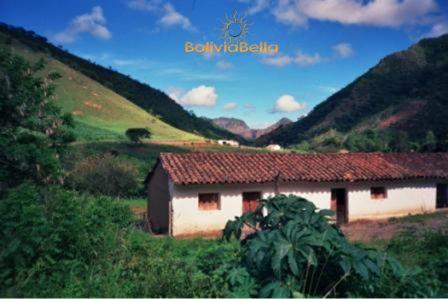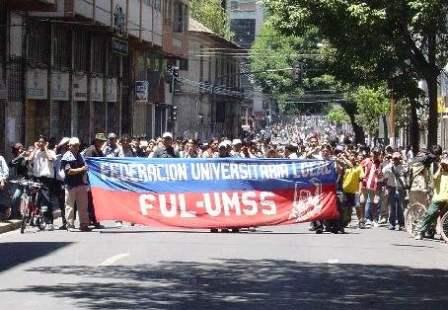|
Education in Bolivia: Public Schools The public education system in Bolivia is in a general state of disarray. Unfortunately, the Bolivian government does not dedicate sufficient funds to provide higher salaries for quality teachers, maintain and furnish schools and classrooms, or provide necessary supplies and meals equally to all students, and no public schools in Bolivia provide buses or any other form of transportation. Extra-curricular activities such as sports are virtually non-existent although most schools do promote certain social gatherings and celebrate specific holidays. Over the past few years the Bolivian government has dedicated more funds to building new public schools in previously underserved, underprivileged areas, but the quality of education at public schools and universities in general, remains much lower than at private options.
The government set a public education curriculum that all public schools (called "colegios fiscales") and private schools (called "colegios particulares") must follow. A large education reform program was initiated in an attempt to improve the quality of public education called the Reforma Educativa. Many changes were made to the state curriculum. In addition, this reform mandates certain minimal requirements to ensure schools in rural areas of Bolivia are given a fair shake, including an obligation for all public university students preparing to be teachers to work in schools in rural or other underprivileged areas. There has been progress, but in general, most Bolivian public schools in both urban and rural areas are still very inadequate.
In addition, even though they are public schools, public education is not completely free. Parents must pay school registration fees for their children to attend school, and in addition, uniforms (required at all public schools), books, supplies and materials are not provided by the state. Some families can hardly afford to send their children to school in Bolivia and when teachers go on strike and students suffer the consequences, there are quite frequently confrontations between parents and teachers. Repeating a grade is costly to a family. There is a very high drop-out rate throughout the public school system. Although over 80% of Bolivia's population attends all or part of elementary school, under 35% of the population advances to middle school or graduates from high school. This is also a great disservice to the students as eventually, when they want to get into a state university, they will have to pass difficult entrance exams and many do not qualify. Fewer than 50% of all students who take these exams pass them. Each state university also has a maximum number of students that can be admitted each year (depending on how much room the university has physically); therefore, even if students do pass state entrance exams, a percentage of these will not be admitted into the university until there is room for them. The great majority of the Bolivian population cannot afford to send their sons and daughters to private universities and access to state universities is very competitive despite the overall low quality of education in Bolivia. University professors also go on strike frequently, but their reasons vary from time to time. Most of the time they join in political manifestations in support or rejection of a particular government proposal. Many state university professors and rectors obtain their positions through a personal recommendation or favor (usually from someone of their same political party) and therefore, are obligated to join in demonstrations or strikes led by their particular political party as well, even if the cause has nothing to do with the university. Worse yet, most of the time university students join in these demonstrations as well, either by choice (university students are very politically active and motivated) or by obligation (professors often threatened to lower their grades, not give them a passing grade, or not allow them to take tests, if they don't join in these protests). Professors take roll before and after the demonstrations. Public universities are often closed for hours, days or weeks at a time. Students and teachers block roads, burn piles of tires (filling the environment with thick toxic black smoke), and in some cases, have gotten into confrontations that have resulted in violent riots on city streets. Traffic and public transportation are halted and businesses and stores are damaged and lose income. This is a very sad situation for students who cannot afford private universities.
Students at these public schools may have no supplies at all and there is an incredibly high drop-out rate. In rural areas many children do not advance beyond the 2nd or 3rd grade. In addition, because families in these areas are so poor, many parents simply do not allow their children to go to school as they are needed more urgently at home where they work in the fields, do the housekeeping while their parents are working, or provide the family’s childcare. Add to this the gender disparity: it is often considered "unnecessary" to educate women and girls in some urban areas. The government is taking some steps it believes will lead to the provision of better quality public education in both rural and urban areas. President Evo Morales, for example, was highly influenced by Fidel Castro of Cuba and Hugo Chavez of Venezuela and is attempting to model Bolivia’s public education system (schools and universities) after the socialist systems in these countries, both of which boast high literacy rates and use literacy as the measurement of public education quality; however, literacy and education are not the same thing. His government also attempted to completely do away with private schools altogether (as in Cuba) stating that all students should have access to the same level of education; however, a large part of the Bolivian population so far has forcefully protested against this. Many believe that obligating private schools to conform to public education norms will not increase the quality of education, but rather will greatly decrease it (bring private schools down to a lower quality level rather than bringing public education up to par with private education in Bolivia). Morales' government also declared that all students would attend the school nearest their home and parents would not be given the right to choose which school their children attended. This caused great concern among the public and in fact, protests were so strong, the government eventually issued a letter to appease the population on 29 June 2007 indicating that the private school system will remain intact and that the government respects the rights of parents to decide where their children will be educated. Various non-profit organizations (NGOs) have been working for years in rural areas with the public school system and curriculum, raising the necessary funds to build new schools, remodel existing ones, maintain buildings and classrooms, build restrooms, provide running water, and purchase furniture and materials. Several of these organizations also raise funds for community projects such as water pumps or latrines, drainage systems, solar panels for power, and community gardens the students and their parents cultivate, providing food for the families. The contributions these organizations make to both education and health is enormous. In most of these schools the education level is much higher and drop-out rates are much lower than at public schools run by the government. Other NGOs provide vocational training, business administration skills, product marketing and micro-credit programs to help parents, families and entire communities become self-sustaining. In general, the schools built and maintained by these organizations are in very good condition and have greatly improved access to educational opportunities for rural children. However, constant changes in government officials and authorities make it very hard for them to advance in their work as new authorities often disregard agreements that had been established and signed by their predecessors and the NGOs must start all over again each time new employees and officials are assigned to certain posts. This situation severely delays the incredible good they can do in schools that are otherwise practically abandoned by the state system.     |

